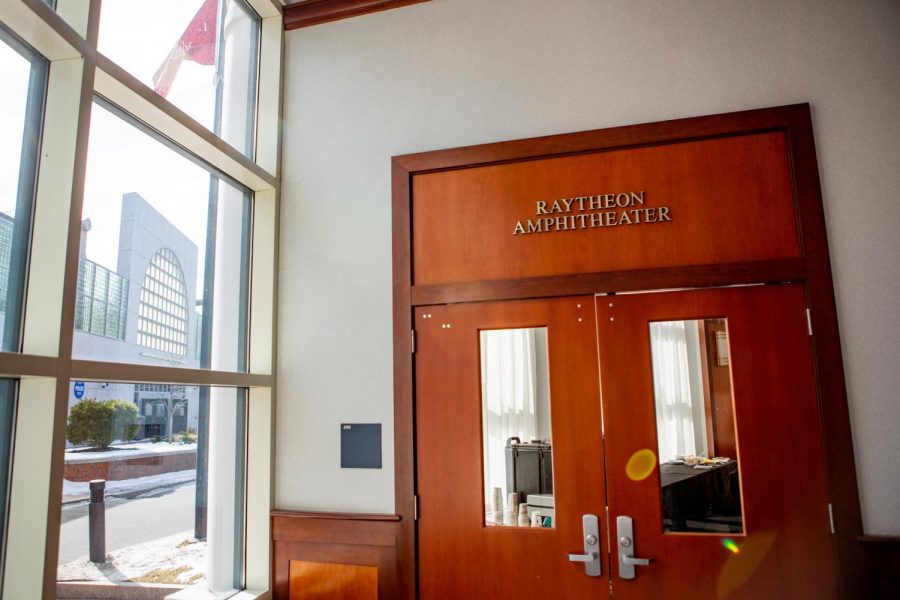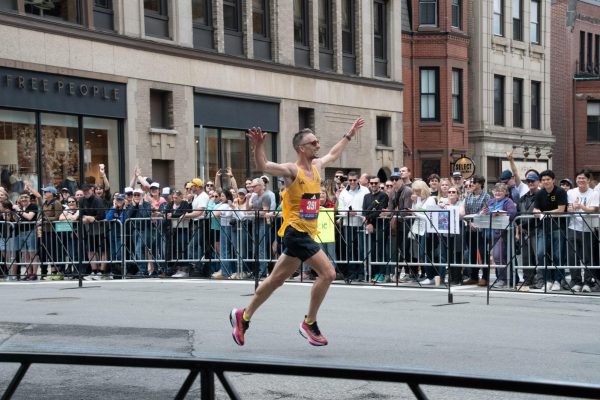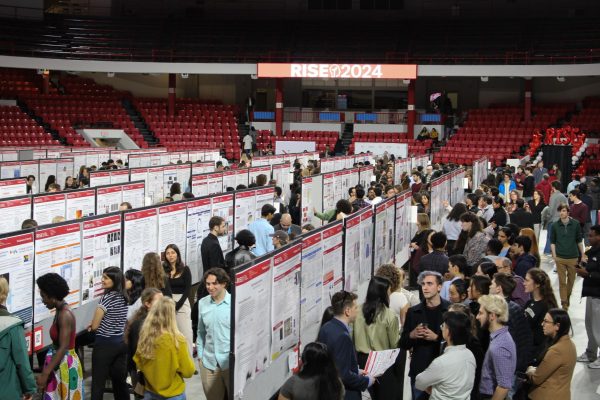Experts come together for NU climate conference
The conference was held at the Raytheon Amphitheater.
October 23, 2019
Students, academics, environmental activists and members of the public gathered in Raytheon Amphitheater Oct. 18 for Turning Up the Heat: Climate Resilience and Community Engagement, hosted in partnership by Northeastern’s School of Public Policy & Urban Affairs and the UMass Boston Sustainable Solutions Lab. At the conference, leading local and national environmental groups discussed global resilience efforts based in the Boston area.
Municipalities in the Boston area, Northeastern professors and experts from organizations like Boston Harbor Now and Emerald Necklace Conservatory came together to discuss how climate change has impacted the communities in the Greater Boston area.
The event featured presentations from panelists focusing on studies and actions organizations are taking to combat the effects of climate change from different backgrounds and perspectives.
“Our goal today, bottom line, is to meet each other and share information with each other both publicly and privately,” said Ted Landsmark, professor of public policy and director of the Dukakis Center for Urban and Regional Policy, in his opening statement during the event. “We are talking about generating diverse partnerships among ourselves and collaborative activity among ourselves.”
According to the World Resource Institute, 70 percent of urban areas already deal with the impacts of rising temperatures, especially cities and towns on the coasts. The Institute’s website said cities have to be “sources of great resilience and key players in the global movement to prepare some of the world’s most vulnerable communities for climate change.”
Robin White, executive director of the Global Resilience Institute at Northeastern, discussed the similarities between Boston and cities like New Orleans that have gone through crises. She explained the important role of resilience in a community’s action during climate emergencies.
“As our understanding of how our collective human society and its relations to the natural world as evolved and advanced over the three or four decades, one of the things that I love about resilience is that resilience is the lens that brings all of those things together, because resilience is a relational network outcome,” White said. “It allows the people who are concerned about the environment to work alongside those who understand how that affects the health and vitality of cities.”
Boston City Councilor Michelle Wu gave the keynote address, where she discussed the city’s planning and development around climate resiliency as well.
“We have to think about job transitions with workforce development opportunities to connect residents with the greater economy: education, early education and vocational, to connect youth to these opportunities [and]affordable green housing. Not thinking of affordable housing separate from green housing.” Wu said. “And above all, civic engagement. We have to have a government grounded in community, in people, in each person having a say.”
Rebecca Herst, director of the Sustainable Solutions Lab at UMass Boston, also voiced how important these collaborations have been in the past and for the future of Boston’s climate conversation and activism. UMass Boston partnered with Northeastern’s School of Public Policy and Urban Affairs to sponsor this event.
“It was great to have the opportunity to hear other speakers because it alerts you to cool work that is happening and audience [members] that heard me speak came up to me and were excited to think about connecting in the future,” Herst said. “I think whenever there is a chance for people to come together on shared interests there is great opportunity for collaboration.”
Jade Lin, a fourth-year environmental science student, attended the event and said she found it interesting to hear the different points of view from the eclectic group of panelists at the event.
“It’s a matter of, do you want to have a choice in the future you want to be in? It definitely has some sort of impact on you, not just climate but where you live, what kinds of community development you want and, if you’re a student, what kinds of things on campus would be good for a student to have,” Lin said. “It is really cool to see how diverse both the research in the city and the nonprofits are out there.”
On the same topic of climate resiliency, Landsmark decided to co-host an open classroom next semester that fosters a discussion with experts, students and the general public on topics about the climate.
“The presentations at this conference were very brief because we wanted to present a wide range of viewpoints and approaches,” Landsmark said. “We will be going into greater detail in the open classroom in the spring, where some of these same presenters will be invited to make more in-depth presentations.”
The conference also gave audience members the opportunity to think more about climate resilience and what it can mean for their communities and the city of Boston.
“I think that there is a lot of fear around climate change and it is easy to feel like it is just a big problem and we are so small,” said Herst. “I think that having events like this is really helpful for people to realize there is work happening on the ground and in communities that is pushing things in the right direction.”


















